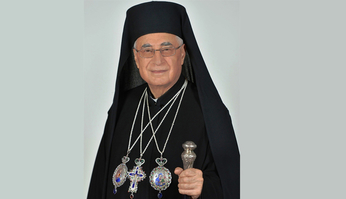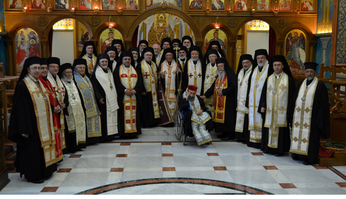Patriarch Youssef
Visit to Germany then Romania 2007
Visit of His Beatitude Gregorios III to Cologne, Germany, 30 August-2 September
His Beatitude visited Cologne, Germany, arriving by air at Frankfurt on 30 August and meeting with members of the Order of St. Lazarus at the Hotel Jolly, on the evening of his arrival.
Next day, His Beatitude attended a formal reception by the Mayor of Cologne, Fritz Schramma, to mark the opening of the DINO Symposium (German Initiative for the Middle East), entitled “Ways to Peace.”
DINO’s purpose is “to support and facilitate the understanding of the complicated contexts (of the situation in the Middle East) by raising awareness, preventing and combating prejudices and supporting rapprochement between the parties to the conflict, without however formulating political statements or being subject to political influence.”
The Symposium continued on 1 September, meeting at the Old Council House in the city centre. The morning included talks and workshops, before a working convivial lunch, followed by an afternoon platform discussion, broadcast on radio and television. The discussion, chaired by the founder of DINO, Manfred Erdenberger, included His Beatitude, Prof. Dr. Joachim Gardemann, head of the central agency for humanitarian assistance of the FH Muenster, Rudolf Dressler, former Ambassador of the Federal Republic to Israel and Abdallah Frangi, foreign policy spokesman for the Palestinian Fatah party.
Reception in the Hansasaal, Cologne. Photo courtesy of http://www.dino-muenster.de/2_symposion.html
Visit of His Beatitude to Romania
After leaving Germany, His Beatitude went on to Romania, where he attended the Third European Ecumenical Assembly at Sibiu.
The message of this gathering includes ten recommendations for the future.
Addressing the situation in Europe today, the assembly appealed to the continent’s churches to support immigrants and other ethnic minorities and to “offer better pastoral care for migrants, asylum seekers and refugees”.
On the subject of the continuing quest for Christian unity, the assembly recommended that churches renew their common mission “to proclaim Christ as the Light and the Saviour of the world”; that discussion be continued among Christian confessions regarding “mutual recognition of baptism;” that more opportunities be provided for common prayer, pilgrimages, theological education and study in support of Christian values; and that churches embrace “the full participation of the whole people of God” including “young people, the elderly, ethnic minorities and disabled people.”
The assembly reaffirmed a set of guidelines agreed in Europe for Christian interaction and cooperation, the Charta Oecumenica, as a “stimulating” resource “for our ecumenical journey in Europe”.
The assembly also exhorted European churches and European institutions to be courageous in addressing the needs of the whole world for ecological justice, human rights and other issues of globalisation; and the backing of initiatives for debt cancellation and fair trade.
Finally, in its most specific recommendation, EEA3 endorsed a proposal that “the period from the 1st of September to the 4th of October be dedicated to prayer for the protection of Creation and the promotion of sustainable lifestyles that reverse our contribution to climate change.”
His Beatitude expressed himself particularly pleased with “wonderful meetings with the Orthodox” Christians he met in Romania.

